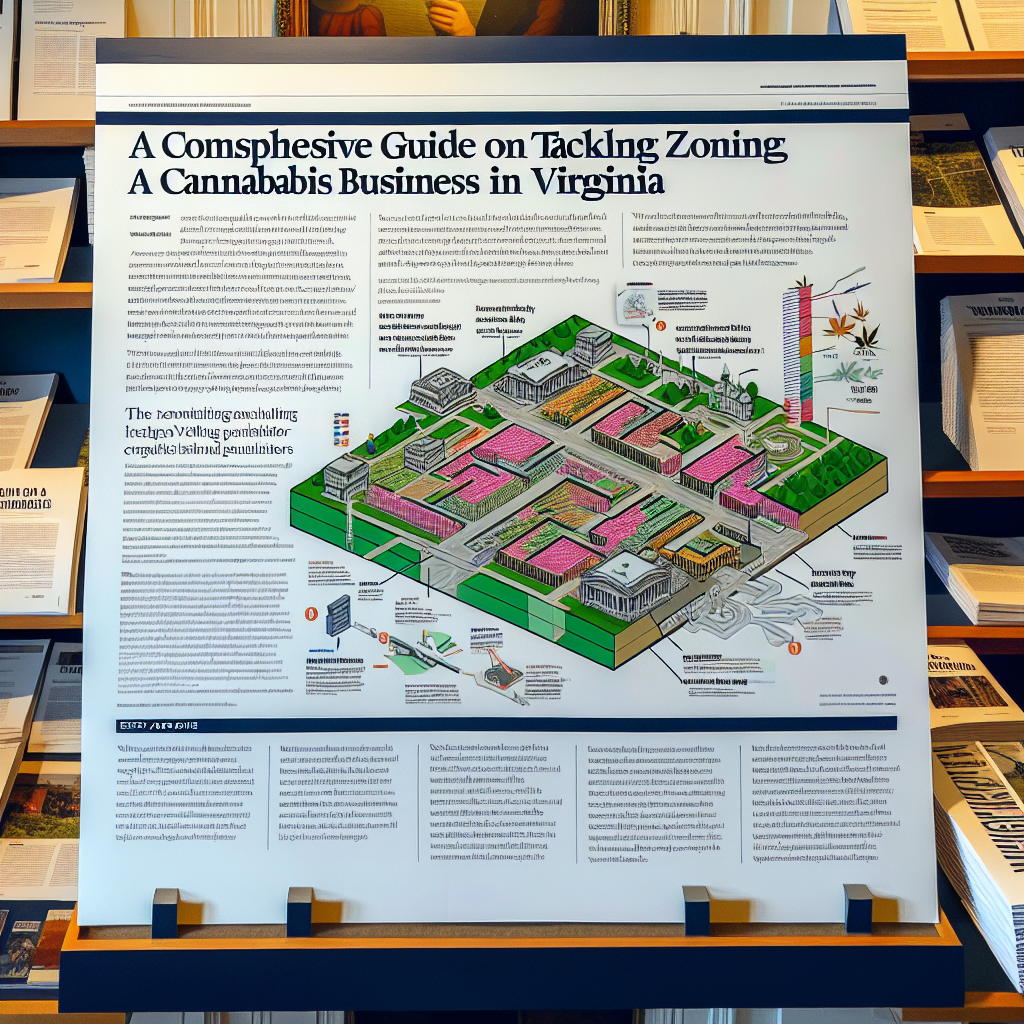If you’re considering starting a cannabis business in Virginia, it’s crucial to understand the complex world of zoning regulations. Navigating these regulations can be a daunting task, but with the right knowledge and preparation, you can ensure your business is compliant and set up for success. From understanding the different zoning districts to knowing where cannabis businesses are permitted, this article will guide you through the ins and outs of navigating zoning regulations for a cannabis business in Virginia.

Understanding Zoning Regulations
Zoning regulations play a crucial role in determining where businesses can operate and what types of activities they can engage in within a specific area. Whether you are looking to start a cannabis business or any other type of venture, understanding zoning regulations is vital to ensure compliance and secure a suitable location for your operations.
Types of Zoning Regulations
Zoning regulations generally fall into three categories: local zoning laws, state zoning laws, and federal zoning laws. Local zoning laws set the guidelines for land use and development within a particular city or county. These regulations outline which areas are designated for residential, commercial, industrial, or other purposes. State zoning laws provide a more comprehensive framework that applies to multiple jurisdictions within a state. Federal zoning laws primarily involve regulations related to airports, military bases, or other federally controlled areas.
Local Zoning Laws
When it comes to navigating zoning regulations for a cannabis business in Virginia, understanding the local zoning laws is crucial. Different localities within the state may have their own zoning ordinances, which can vary widely in terms of their allowances and restrictions. It’s essential to research and familiarize yourself with the specific regulations in the city or county where you plan to operate.
State Zoning Laws
While local zoning laws govern specific cities or counties, state zoning laws provide a broader framework for land use and development throughout the entire state. In Virginia, the state zoning laws set certain guidelines for zoning classifications, such as agricultural, residential, and commercial districts. However, these state laws often delegate the authority to regulate and enforce zoning regulations to the localities, giving them the power to create their own zoning ordinances.
Identifying Suitable Zoning Districts
Once you understand the different types of zoning regulations, it’s time to identify suitable zoning districts where your cannabis business can legally operate.
Zoning Districts for Cannabis Businesses
In Virginia, zoning districts that permit cannabis-related activities may vary from one locality to another. Some areas may designate specific zones, such as industrial or agricultural districts, where cannabis cultivation, processing, or dispensing may be allowed. Others may require special permits or conditional use approvals. It’s essential to consult the local zoning ordinances or contact the planning department in the respective city or county to determine which zoning districts are suitable for your cannabis business.
Restrictions and Prohibited Areas
While some zoning districts may permit cannabis businesses, it’s essential to be aware of any restrictions or prohibited areas that may apply. Certain sensitive areas, such as schools, parks, or residential neighborhoods, may have restrictions on allowing cannabis-related activities nearby. Understanding these limitations will help you avoid potential conflicts and ensure compliance with zoning regulations.
Consulting Zoning Maps
To aid in identifying suitable zoning districts, jurisdictions often provide zoning maps that outline the different zoning classifications within their boundaries. These maps can serve as valuable resources to determine which areas are compatible with your cannabis business activities. By reviewing the zoning maps, you can assess the distribution of various districts and identify potential locations that align with the zoning requirements.
Researching Local Zoning Ordinances
Once you have identified potential zoning districts, it’s crucial to delve deeper into the local zoning ordinances to understand the specific requirements and processes you need to follow.
Identify Specific Zoning Requirements
Local zoning ordinances typically include specific requirements related to setbacks, building size limitations, parking, signage, and other factors that may impact your cannabis business operations. It’s important to thoroughly review these requirements to ensure your facility and operations align with the regulations. For example, setback requirements may dictate how far your facility must be located from residential areas or other sensitive locations.
Review Conditional Use Permits
In some cases, zoning ordinances may allow cannabis businesses as conditional uses within specific districts. Conditional use permits (CUPs) grant permission for certain activities that are not typically permitted in a specific zoning district. These permits often require additional reviews, public hearings, and the satisfaction of certain conditions. Understanding and complying with the CUP requirements is crucial if your cannabis business falls under this category.
Assess License and Permitting Processes
Apart from zoning requirements, it’s essential to research and understand the license and permitting processes specific to cannabis businesses in Virginia. Various state and local agencies oversee the licensing and permitting processes, and each may have its own set of requirements, fees, and timelines. By familiarizing yourself with these processes, you can navigate the bureaucracy more effectively and ensure that you have all the necessary permits and licenses to operate legally.
Engaging Local Authorities
Navigating zoning regulations often involves engaging with local authorities and building positive relationships with the officials who enforce these regulations. Here are some tips for effectively engaging local authorities:
Building Relationships with Officials
Developing a rapport with local officials can be beneficial when navigating zoning regulations. It’s important to maintain open lines of communication, be respectful and professional, and demonstrate your willingness to comply with the regulations. By building positive relationships, you may find that officials are more willing to assist you in understanding and navigating the zoning requirements for your cannabis business.
Attending Public Meetings
Public meetings, such as planning commission meetings or city council sessions, provide opportunities to stay informed and engage directly with the decision-makers. Attending these meetings enables you to learn about proposed zoning changes, voice any concerns, and advocate for your business’s interests. It also allows you to gain insights into the perspectives of local authorities and community members, helping you navigate the zoning process more effectively.
Seeking Professional Advice
Navigating zoning regulations can be complex, especially when it comes to the unique requirements for cannabis businesses. Seeking professional advice from zoning attorneys, land use planners, or consultants experienced in the cannabis industry can provide valuable insights and guidance. These professionals can help you understand the intricacies of zoning regulations, ensure compliance, and advocate for your business’s interests.

Site Selection and Lease Considerations
Once you have a thorough understanding of zoning regulations and have engaged with local authorities, you can focus on site selection and lease considerations for your cannabis business.
Traffic and Accessibility
When selecting a site for your cannabis business, factors such as traffic volume and accessibility are critical. Consider the proximity to major roads or highways and assess the potential impact on traffic flow and ease of customer access. Evaluating these factors will not only help ensure the success of your business but also demonstrate to local authorities that you have considered the potential impact on the surrounding community.
Security and Safety Measures
Cannabis businesses are often subject to additional security and safety requirements to prevent unauthorized access, theft, and other potential risks. When selecting a site, you need to identify whether the location meets these security and safety requirements. Adequate lighting, fencing, surveillance systems, and other security measures may be necessary to comply with both zoning regulations and state-specific security mandates.
Lease Agreement Review
Carefully reviewing the lease agreement before committing to a property is crucial. Ensure that the lease allows for the operation of a cannabis business, complies with zoning regulations, and provides the necessary flexibility to adapt to evolving regulations. It’s advisable to consult with legal professionals experienced in cannabis business leasing to ensure that the lease agreement adequately protects your interests.
Understanding Special Use Permits (SUPs)
Special Use Permits (SUPs) are often required when specific activities are not permitted by right in a zoning district but may be allowed under certain conditions. Understanding SUPs is essential when navigating zoning regulations for a cannabis business.
Definition and Purpose of SUPs
A special use permit grants permission for activities that may not be compatible with the standard uses allowed in a particular zoning district. These permits typically involve a detailed review process to ensure that the proposed use meets specific criteria, such as minimizing adverse impacts on adjacent properties or the community at large. SUPs provide local authorities with a level of discretion in determining whether certain activities can be permitted in specific locations.
Application Process and Requirements
The application process for SUPs typically involves submitting an application, paying fees, and providing supporting documentation outlining the proposed use and its compliance with zoning regulations. The specific requirements may vary depending on the locality, so it’s crucial to carefully review the application process and follow all instructions. It’s advisable to engage a land use attorney or consultant experienced in SUP processes to ensure a well-prepared application.
Public Hearing Involvement
SUP applications usually require a public hearing, providing an opportunity for members of the community to voice their opinions on the proposed use. It’s important to engage positively with the community during this process, addressing any concerns and demonstrating the potential benefits of your cannabis business. Engagement during public hearings shows local authorities that you are responsive to community interests and committed to being a responsible and valuable member of the community.

Complying with Setback and Buffer Requirements
Setback and buffer requirements are common zoning regulations that dictate the distance between certain activities or structures and sensitive areas to minimize potential impacts.
Minimum Distance from Sensitive Areas
Zoning regulations often specify minimum distances between cannabis businesses and sensitive areas such as schools, parks, churches, or residential neighborhoods. Complying with these setback requirements is crucial to ensure that your operations are not in violation of zoning regulations. Understanding the specific setback distances outlined in the local zoning ordinances will allow you to identify suitable locations for your cannabis business while preserving the integrity of the surrounding community.
Buffer Zones and Landscaping
Buffer zones serve as transitional areas designed to reduce the visual, noise, or other impacts of one land use on another. Zoning regulations may require cannabis businesses to establish and maintain buffer zones between their operations and neighboring properties. These buffer zones may include landscaping features, such as trees or shrubs, to provide a visual or physical barrier. Understanding these buffer zone requirements and incorporating suitable landscaping measures is essential for compliance with zoning regulations.
Exceptions and Variances
In certain situations, exceptions or variances to setback and buffer requirements may be granted. These exceptions typically involve demonstrating that compliance would impose an undue hardship or that the proposed use is compatible with the surrounding area despite not meeting the standard requirements. If you believe that your cannabis business may qualify for an exception or variance, it’s advisable to consult with professionals familiar with the local zoning regulations and the process for requesting exceptions.
Ensuring Compliance with Environmental Regulations
Operating a cannabis business involves environmental considerations, and ensuring compliance with environmental regulations is essential for responsible and sustainable operations.
Waste Management and Disposal
Cannabis cultivation, processing, and retail operations generate waste, including plant material, byproducts, and packaging. Complying with waste management and disposal regulations is crucial to minimize environmental impacts and potential health hazards. Familiarize yourself with the state and local regulations governing waste management and disposal to implement proper procedures and ensure compliance.
Water and Air Quality Standards
Water and air quality are essential factors in maintaining a sustainable cannabis business. Regulations regarding water usage, irrigation practices, and potential air emissions may vary depending on the locality and state. Understanding and complying with these standards will help ensure that your operations promote good environmental stewardship and adhere to zoning regulations.
Stormwater Management
Runoff from cannabis cultivation or manufacturing facilities can impact surrounding water bodies and ecosystems. Zoning regulations often include stormwater management requirements to mitigate the potential adverse effects of runoff. Implementing measures such as on-site retention ponds, permeable surfaces, or green infrastructure can help you comply with stormwater management regulations and minimize your environmental footprint.

Navigating State Regulations and Restrictions
In addition to local zoning regulations, cannabis businesses need to navigate state-specific regulations that govern licensing, advertising, branding, and product packaging.
State Licensing and Permitting
State licensing and permitting processes are crucial for cannabis businesses in Virginia. Different license types exist for various activities such as cultivation, processing, manufacturing, and retail. Understanding the specific requirements, fees, application processes, and deadlines set by the state is essential to secure the necessary licenses and permits to operate legally.
Advertising and Branding Restrictions
Virginia has specific regulations regarding cannabis advertising and branding to ensure responsible marketing practices and prevent excessive exposure to youth. These regulations place restrictions on where and how cannabis products can be advertised, limiting exposure to certain audiences and requiring clear and accurate labeling. Complying with these regulations will help you establish a reputable brand while adhering to state laws.
Product Packaging and Labeling Guidelines
To promote consumer safety and ensure product transparency, cannabis product packaging and labeling must comply with specific state guidelines. These guidelines may include requirements for child-resistant packaging, ingredient disclosure, warning labels, and dosage information. Familiarizing yourself with these guidelines and incorporating them into your packaging and labeling processes will help you meet regulatory requirements and ensure consumer confidence.
Addressing Community Concerns
Addressing community concerns is a crucial aspect of navigating zoning regulations and establishing a successful cannabis business that is welcomed by the local community.
Community Outreach and Education
Engaging in community outreach and education can help dispel misconceptions about cannabis businesses and build trust within the community. Organizing informational sessions, participating in community events, or supporting local initiatives can demonstrate your commitment to responsible and transparent operations. By addressing concerns and providing accurate information, you can work towards establishing positive relationships with community members.
Addressing Safety and Security Concerns
Safety and security are valid concerns for both the community and cannabis businesses. Implementing robust security measures, such as surveillance systems, alarm systems, and properly trained staff, can help alleviate these concerns. Additionally, actively collaborating with local law enforcement and providing them with insights into your security protocols can foster trust and ensure a safe environment for both your business and the community.
Collaborating with Neighborhood Associations
Neighborhood associations play an influential role in shaping local communities and can be valuable allies for cannabis businesses. Reach out to neighborhood associations in the areas where you plan to operate, and engage in open and transparent discussions. By collaborating with these associations, listening to their concerns, and addressing any legitimate issues, you can build strong relationships and gain community support for your cannabis business.
In conclusion, navigating zoning regulations for a cannabis business in Virginia requires a comprehensive understanding of local and state regulations, engaging with local authorities, and addressing community concerns. By effectively researching zoning ordinances, identifying suitable zoning districts, and complying with setback, buffer, and environmental requirements, you can establish a successful and responsible cannabis business that meets regulatory standards and earns the support of the community.

